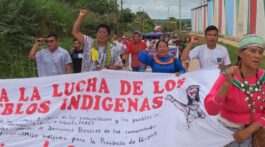 Alberto Pizango, líder de la organización indígena AIDESEP, ha arremetido contra Perenco por negar la existencia de indígenas aislados en una remota zona de la Amazonia peruana, donde pretende construir un oleoducto para explotar unos 300 millones de barriles de crudo pesado, según las estimaciones que se barajan.
Alberto Pizango, líder de la organización indígena AIDESEP, ha arremetido contra Perenco por negar la existencia de indígenas aislados en una remota zona de la Amazonia peruana, donde pretende construir un oleoducto para explotar unos 300 millones de barriles de crudo pesado, según las estimaciones que se barajan.
En una carta dirigida al departamento de asuntos indígenas del Gobierno peruano, INDEPA, Pizango señala que investigaciones antropológicas independientes han confirmado que estos pueblos existen, y que esto está en conocimiento del gobierno regional, de un respetado instituto de investigación y de Barrett Resources, la empresa que trabajaba en la región antes de Perenco. Asimismo, la carta alega que el gobierno regional ha prohibido a los madereros trabajar en la zona debido a su preocupación por el impacto potencial que esto podría tener sobre los indígenas aislados que viven en ella.
La carta de Pizango, con fecha de 3 de junio, finaliza pidiendo a INDEPA que ordene a Perenco detener sus trabajos en la región: una petición que Survival International también está haciendo. Según la carta, cualquier tipo de operación petrolífera pondría en peligro la supervivencia de los indígenas aislados.
Perenco reveló recientemente que ha transportado por helicóptero “más de 50.000 toneladas de material y bienes fungibles, el equivalente a siete torres Eiffel” a la región. La empresa niega la existencia de los indígenas aislados, aunque en un “plan de contingencia” presentado al Ministerio de Energía peruano este año, recomendaba a sus trabajadores, en ciertos casos, “asustarlos y demorarlos” en caso de producirse el contacto.
Pizango regresó a Perú el pasado mes de mayo, tras pasar once meses en Nicaragua, donde solicitó asilo político después de que se le imputaran cargos en relación con los violentos sucesos vividos en la Amazonia peruana el 5 de junio de 2009. A su regreso, fue detenido inmediatamente, y liberado al día siguiente.
Según declararon hoy fuentes internas a Survival: “El hecho de que el señor Pizango esté presionando a Perenco tan pronto, después de su regreso largamente esperado a Perú, es una clara señal de la urgencia del caso”. Alberto Pizango, leader of indigenous organisation AIDESEP, has condemned Perenco for denying the existence of uncontacted Indians in a remote region of the Peruvian Amazon where it aims to build a pipeline to exploit an estimated 300 million barrels of heavy crude oil.
Alberto Pizango, leader of indigenous organisation AIDESEP, has condemned Perenco for denying the existence of uncontacted Indians in a remote region of the Peruvian Amazon where it aims to build a pipeline to exploit an estimated 300 million barrels of heavy crude oil.
In a letter to the Peruvian government’s indigenous affairs department, INDEPA, Pizango points out that independent anthropological research has confirmed that the tribes exist, and that this has been acknowledged by the regional government, a highly-regarded research institute, and Barrett Resources, the company which worked in the region before Perenco.
The letter also alleges that the regional government banned loggers from working in this region because of its concern about the potential impact on the uncontacted Indians living there. Pizango’s letter, dated 3 June, ends by urging INDEPA to order Perenco to stop working in the region – a demand that Survival is also making. ‘Any kind of oil operation puts the uncontacted Indians’ survival at risk,’ says the letter. Perenco recently revealed it has transported, by helicopter, ‘more than 50,000 tons of material and consumables, the equivalent of seven Eiffel Towers’ into this region.
The company denies the tribes’ existence, although, in a ‘contingency plan’ presented to Peru’s Energy Ministry earlier this year, it recommended that its workers, in certain instances, ‘scare and repel’ the Indians if contact is made.
Pizango returned to Peru at the end of May after 11 months in Nicaragua, where he sought political asylum after being charged in connection with the violent conflict in Peru’s Amazon on 5 June 2009. He was arrested immediately on his return, but released on bail the next day.
Survival International‘s director, Stephen Corry, said today, ‘It’s a clear sign of the urgency of this issue that Mr Pizango is lobbying Perenco so soon after his long-anticipated return to Peru.’












No Comment